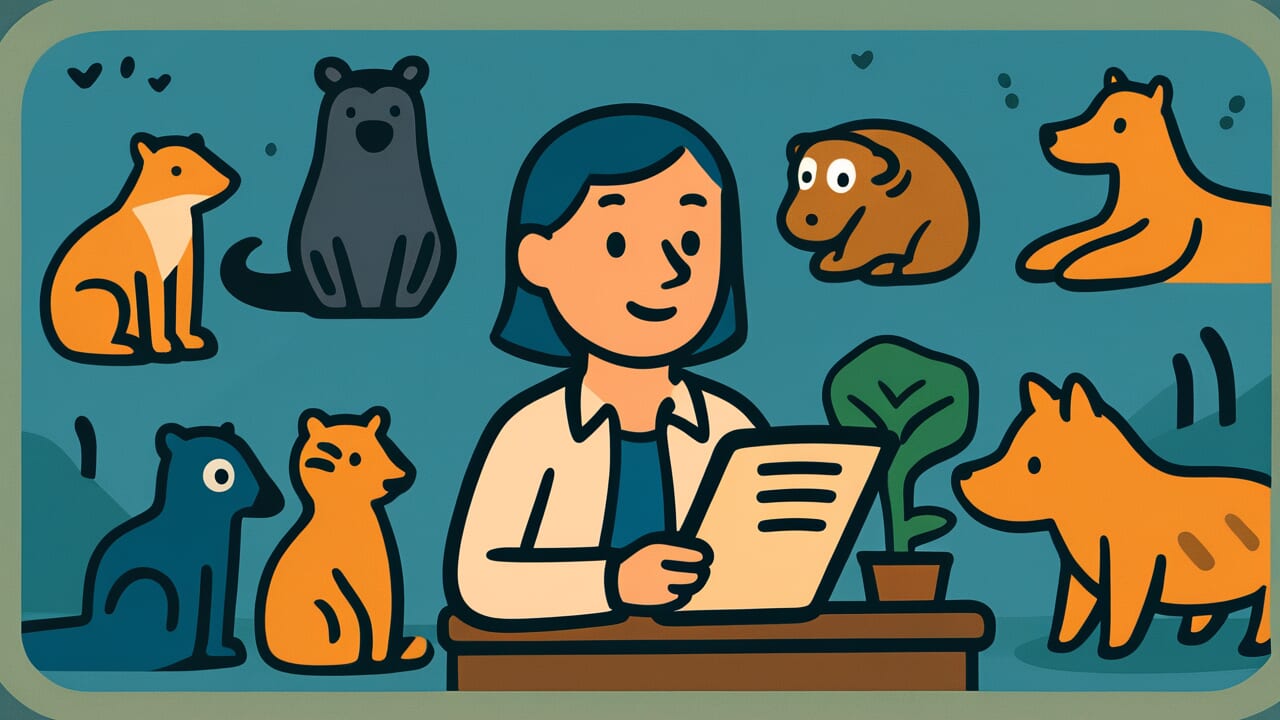How to Read “Zoology teaches by beasts”
Zoology teaches by beasts
[zoh-OL-uh-jee TEECH-iz bahy beests]
Zoology sounds like “zoo-all-oh-gee”
Meaning of “Zoology teaches by beasts”
Simply put, this proverb means that we can learn important life lessons by studying how animals behave.
The literal words talk about zoology, which is the science of studying animals. When it says “teaches by beasts,” it means animals themselves are the teachers. The deeper message is that nature provides wisdom through examples we can observe in the animal world.
We use this idea today when we look at animal behavior for insights. Scientists study how wolves work together in packs to understand teamwork. People watch how ants build colonies to learn about organization and hard work. Even pet owners notice how their dogs show loyalty or how cats demonstrate independence.
What’s interesting about this wisdom is that it suggests learning doesn’t only come from books or teachers. Animals demonstrate survival skills, social cooperation, and natural instincts that humans can understand and apply. Many people find that watching nature helps them see patterns that exist in their own lives and relationships.
Origin and Etymology
The exact origin of this specific proverb is unknown, though it reflects ideas that have existed for centuries. The formal study of animal behavior became more organized during the development of natural sciences. People have always observed animals to understand the world around them.
Throughout history, humans relied on animal behavior for practical knowledge. Farmers watched animals to predict weather changes. Hunters studied animal patterns to improve their success. Ancient communities observed which animals were dangerous and which could be helpful companions.
The saying likely developed as scientific thinking became more common. As people began to see patterns in nature, they realized that systematic observation of animals could teach valuable lessons. The wisdom spread through educational and scientific communities who recognized the value of learning from natural examples.
Interesting Facts
The word “zoology” comes from two Greek words: “zoon” meaning animal and “logos” meaning study or knowledge. The term “beast” originally meant any four-legged animal, not just wild or dangerous creatures. This proverb uses parallel structure, with “zoology” and “teaches” both having similar sounds that make it memorable.
Usage Examples
- Teacher to student: “Watch how the ants work together to build their colony – zoology teaches by beasts.”
- Parent to child: “See how patient the spider is with her web? – Zoology teaches by beasts.”
Universal Wisdom
This proverb reveals a fundamental truth about how humans learn and understand their place in the world. Throughout history, people have recognized that animals demonstrate pure, unfiltered responses to life’s challenges. Unlike humans, animals don’t overthink or create complicated explanations for their behavior.
Animals operate on instinct and necessity, which strips away the confusion that often clouds human decision-making. When a bird builds a nest, it follows patterns perfected over millions of years. When a pack hunts together, each member knows their role without lengthy discussions or power struggles. These examples show humans what effective behavior looks like without the complications of ego or social pressure.
The deeper wisdom lies in recognizing that humans are also part of the natural world, despite our complex societies and technologies. We share basic needs for survival, cooperation, and adaptation with other creatures. By observing how animals solve problems, form relationships, and respond to threats, we can better understand our own instincts and motivations. This connection to the natural world provides a foundation for wisdom that remains constant even as human societies change rapidly.
When AI Hears This
Animals show us what humans really want without the fancy explanations. A wolf doesn’t pretend it leads for noble reasons. It simply dominates because dominance works. Humans do the same things but create elaborate stories about duty and service. Animals strip away our comfortable lies about motivation.
This pattern reveals why humans study animal behavior so intensely. We recognize ourselves in their raw actions. A peacock’s display mirrors human status games perfectly. The difference is we call our displays “networking” or “personal branding.” Animals become mirrors that reflect our hidden programming back at us.
What’s remarkable is how this self-deception actually helps humans function. Our elaborate stories about noble motives make cooperation easier. We can work together while pretending we’re not competing. Animals can’t do this sophisticated social dance. Their honesty limits them to simpler group structures than human societies.
Lessons for Today
Living with this wisdom means developing the habit of observing the natural world with curiosity and openness. Animals demonstrate qualities like persistence, adaptability, and cooperation without pretense or self-consciousness. Watching how they navigate challenges can provide clarity when human situations feel overwhelming or confusing.
In relationships and group settings, animal behavior offers insights into natural social dynamics. Pack animals show how leadership can be both strong and supportive. Herd animals demonstrate how individuals can maintain their identity while contributing to group safety. These observations can help people understand when to lead, when to follow, and when to work independently.
The challenge lies in applying these natural lessons to complex human situations without oversimplifying important differences. Humans have language, culture, and moral reasoning that animals don’t possess. The wisdom comes from recognizing which animal behaviors reflect universal principles and which human complexities require different approaches. By staying connected to natural examples while honoring human uniqueness, people can access both instinctive wisdom and thoughtful decision-making in their daily lives.



Comments